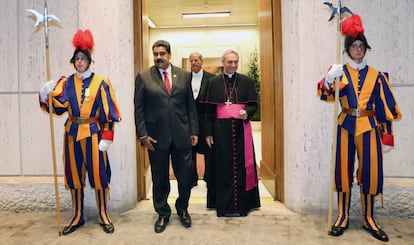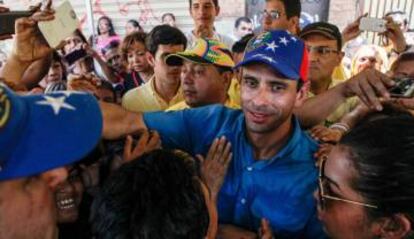Venezuela opposition rejects Vatican’s offer to mediate in talks
Henry Capriles and others close the door to negotiations that the Church had planned to host

The latest attempt at dialogue between the Nicolás Maduro administration and the opposition has failed even before it began.
A few hours after the Vatican announced on Monday that the first round of talks would be held the following Sunday on Margarita Island, the process broke down completely.
The political crisis in the country deepened after the administration stacked bureaucratic roadblocks to stall an opposition-led recall referendum to remove Maduro.
They are implementing new tactics for a soft coup
Pedro Carreño, chavista congressman
Meanwhile, regime supporters stormed the National Assembly where the opposition, which holds a majority, opened a political trial against the president on Monday.
The political crisis, made worse by court decisions to nix the recall referendum, threatens to spiral into attacks and counterattacks between the government and the opposition.
After a five-day tour of four oil-producing countries in Central Asia and the Middle East, Maduro rushed home. Meanwhile the opposition, which began a political trial to oust the president, has accused him of “neglect of duty” and summoned him to appear in Congress next Tuesday.

Still, Maduro made two stops on his journey back. He and Pope Francis met on Monday in Rome, where the pontiff asked him to be “courageous” and take the path to dialogue. The Vatican’s efforts had seemed fruitful: on Monday, Emil Paul Tscherrig, the pope’s special envoy to Venezuela, announced that the first round of talks would be held this coming Sunday.
But opposition leaders, including Henrique Capriles, rejected the offer just a few hours later.
Maduro also visited newly appointed United Nations Secretary General António Guterres in Lisbon. Meanwhile, the regime organized a massive demonstration in Caracas to welcome back the president and to “reject the attempts of the right to carry out a coup d’état.” The opposition is trying to incite a Brazilian-style “parliamentary” riot, the chavista administration said.
Loss of rights
The opposition, which holds a majority in the National Assembly, has begun a congressional investigation to determine the “responsibility of President Nicolás Maduro in the crisis.” Several speakers took the floor on Monday to argue in favor of the process that seeks to impeach Maduro.
Opposition member and Mérida Deputy Williams Dávila said “the people do not conspire, the people recall.” Deputy Juan Mattheus opened the debate, saying: “By abandoning the Constitution, he became a despot; he turned the rights of all into the rights of a few.”
“They are implementing new tactics for a soft coup,” Pedro Carreño, a chavista congressman, argued. “It’s about criminalizing and demonizing the government, making it look like a dictatorship,” he added. Edwin Rojas, a fellow chavista, reminded the room of the Supreme Court ruling in September that held parliament in contempt, invalidating all moves by the National Assembly.
These events are a preamble to the massive march dubbed “The Taking of Venezuela” that the opposition is planning to hold today. Capriles, governor of Miranda and a two-time presidential candidate, underscored that the protest is only the beginning of a process “that may last days.”
But then he seemed to soften his resistance to dialogue by saying that if “a photo was enough to resolve this crisis,” he would be willing to meet “with the devil himself.” But, he explained, any future talks must take place in Caracas, “near public opinion and the press.”
English version by Dyane Jean François.
Tu suscripción se está usando en otro dispositivo
¿Quieres añadir otro usuario a tu suscripción?
Si continúas leyendo en este dispositivo, no se podrá leer en el otro.
FlechaTu suscripción se está usando en otro dispositivo y solo puedes acceder a EL PAÍS desde un dispositivo a la vez.
Si quieres compartir tu cuenta, cambia tu suscripción a la modalidad Premium, así podrás añadir otro usuario. Cada uno accederá con su propia cuenta de email, lo que os permitirá personalizar vuestra experiencia en EL PAÍS.
¿Tienes una suscripción de empresa? Accede aquí para contratar más cuentas.
En el caso de no saber quién está usando tu cuenta, te recomendamos cambiar tu contraseña aquí.
Si decides continuar compartiendo tu cuenta, este mensaje se mostrará en tu dispositivo y en el de la otra persona que está usando tu cuenta de forma indefinida, afectando a tu experiencia de lectura. Puedes consultar aquí los términos y condiciones de la suscripción digital.








































